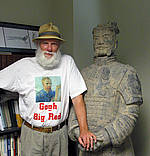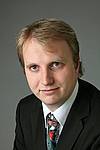Keynote Speakers

C. Richard Johnson, Jr.: "Weave Match Hunting: An Application of Signal Processing to Painting Analysis" (pls request the PDF per mail)
Abstract: The claim that two paintings are on canvas from the same original roll can support conclusions on dating, authenticity, and other issues of basic importance in art historical painting analysis. Traditionally such claims begin with establishing matching average thread counts for the two paintings.
Averages are typically obtained from a few manual spot counts at points scattered across the painting. Manual spot counts are taken from x-rays of paintings mounted on a lightbox and viewed through a magnifying eyepiece. Recognizing thread counting from x-rays as a Fourier spectral analysis problem propelled the founding of the Thread Count Automation Project (TCAP) in 2007.
Being able to compute the thread count for every square centimeter across the painting revealed a striped pattern in the local weave densities. Paintings sharing threads from the same roll will possess the same striped pattern, which converts a weave match search into a correlation problem. The weave density and angle maps produced by automated thread counting are becoming new fundamental tools in technical art history. The challenges of initiating such an interdisciplinary effort will be described along with several discovered weave matches with art historical implications. Some open signal processing challenges are also noted.
Speaker's bio: C. Richard Johnson, Jr. was born in Macon, GA in 1950. He received a PhD in Electrical Engineering from Stanford University, along with the first PhD minor in Art History granted by Stanford, in 1977. Following 4 years on the faculty at Virginia Tech, he joined the Cornell University faculty in 1981, where he is the Geoffrey S. M. Hedrick Senior Professor of Engineering and a Stephen H. Weiss Presidential Fellow. At the start of 2007, after 30 years of research on adaptive feedback systems theory and blind equalization in communication receivers, Professor Johnson accepted an appointment as an Adjunct Research Fellow of the Van Gogh Museum (Amsterdam, the Netherlands) to facilitate the interaction of art historians and conservation specialists with algorithm-building signal processors.

Fabio Ricciato: "Traffic Monitoring for 3G Network Diagnostic: a Doctor's View"
Abstract: A Mobile Data Network is a complex system made of many different functional elements, layers and subsystems in close inter-relationship.
It is also a dynamic object that grows and evolves continuosly, exposed to a highly heterogeneous and ever-changing usage patterns as new applications, services and terminal types emerge and get popular. Passive Traffic Monitoring plays an essential role in the operation and troubleshooting of such systems: from packet-level traces all the way up to aggregate statistics and global indicators, it offers an accurate and rich data basis to the experts. The analysis and interpretation of such data is key to understand "What's going on" in the network, to verify its correct behaviour, to diagnose problems, limitations and emerging weaknesses. In some aspects, the analysis of traffic data oriented to network diagnostic is analogous to the "doctor's visit" of a human body. Along this analogy, the talk identifies the recurring building blocks in the network diagnostic process and highlights the related challenges. Like a medical practitioner, the network expert "walks and drills" through the data following a (partially) structured approach. Data are inspected in slices obtained by aggregation, summarization or sampling. Often, selected data are evaluated in their temporal evolution, pretty much like "vital signals". Domain-specific knowledge is essential to identify What to look at, i.e. to define the signals to consider. During the data processing stage, more or less advanced concepts from statistics and signal processing are used. In the talk, the mutual role of these components is discussed, and some key problems of network data analysis are presented with support of illustrative examples of real-world cases encountered in a real mobile network.
Speaker's bio: Fabio Ricciato received the "Laurea" degree in Electronics Engineering in 1999 and the "Dottorato di Ricerca" (PhD degree) in Information and Communications Engineering in 2003, both from the University "La Sapienza" in Roma, Italy. In 2004 he joined the Forschungszentrum Telekommunikation Wien (FTW) as a Senior Researcher and later became Area Manager for the Networking area of FTW. Since 2007 he holds the position of Assistant Professor at the University of Salento (Italy) where he teaches the course of "Telecommunication Systems". Since 2004 Fabio has been leading a series of applied research projects at FTW focused on network monitoring and traffic analysis in 3G mobile networks, in collaboration with A1TA and Kapsch CarrierCom. The first project resulted in the prototype of a monitoring system that eventually became a carrier-grade product and was installed by one partner mobile operator. Since then, the monitoring system provides real-world data and problem instances that feed his curiosity and that of his research team.

Andreas Burg: From Marconi to Moore: Circuits and Systems for Communications - Still a Challenge?
Abstract: Communication systems have come a long way from analog modulation to complex digital modulations requiring billions of operations per second for well performing transmitters and receivers. On the other hand, integrated circuit technologies have also made a tremendous progress over the past few decades. Today, a square-millimeter of silicon can easily host billions of operations per second even with limited engineering effort on the implementation side. In this talk, we will check on the race between more complex systems and algorithms on one side and silicon process technology on the other side. We will ask the question if and where research in Circuits and Systems for Communications is still a challenge for the future or if all problems can already be solved sufficiently well by the progress in process technology, rendering engineering in this area an art that is merely interesting, but potentially unnecessary.
Authors Bio: Andreas Burg was born in Munich, Germany, in 1975. He received his Dipl.-Ing. degree in 2000 from the Swiss Federal Institute of Technology (ETH) Zurich, Zurich, Switzerland. He then joined the Integrated Systems Laboratory of ETH Zurich, from where he graduated with the Dr. sc. techn. degree in 2006. In 1998, he worked at Siemens Semiconductors, San Jose, CA. During his doctoral studies, he was an intern with Bell Labs Wireless Research for a total of one year. From 2006 to 2007, he held positions as postdoctoral researcher at the Integrated Systems Laboratory and at the Communication Theory Group of the ETH Zurich. In 2007 he co-founded Celestrius, an ETH-spinoff in the field of MIMO wireless communication, where he was responsible for the ASIC development as Director for VLSI. In January 2009, he joined ETH Zurich as SNF Assistant Professor and as head of the Signal Processing Circuits and Systems group at the Integrated Systems Laboratory. Since January 2011, he is a Tenure Track Assistant Professor at the Ecole Polytechnique Federale de Lausanne (EPFL) where he is leading the Telecommunications Circuits Laboratory in the School of Engineering. In 2000, Mr. Burg received the “Willi Studer Award” and the ETH Medal for his diploma and his diploma thesis, respectively. Mr. Burg was also awarded an ETH Medal for his Ph.D. dissertation in 2006. In 2008, he received a 4-years grant from the Swiss National Science Foundation (SNF) for an SNF Assistant Professorship. In his professional career, Mr. Burg was involved in the development of more than 25 ASICs. He is a member of the IEEE and of the European Association for Signal Processing (EURASIP).
NEWS
Thanks to all attendance for visiting!
EURASIP Tutorials are online, feel free to browse them HERE and HERE!
Keynote Speeches are online, feel free to browse them!
Best Student Paper Award goes to ...